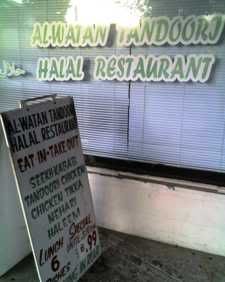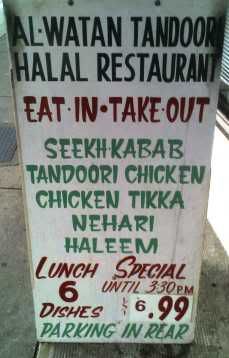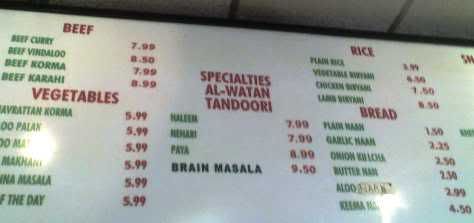This is not the story of a famous person. This is the story of a common man named Shakoor. I believe the stories of common people are worth sharing and you never know what inspiration you may get out of them.
 Work related travel took me to Vancouver recently. The first thing I did after coming out of airport was to drive to my favorite Pakistani restaurant in the city. They make the best ‘nihari’ (a kind of beef curry) in town. The receptionist at the restaurant was no other than the central character of our story today, Shakoor saheb. He seated me and then without taking order from me shouted towards the kitchen ‘ek nihari, do naan’ (one plate curry and two pieces of flat bread). After a second or so he shouted again “And also a cup of teaâ€. This made me laugh and we shook hands. Shakoor saheb apparently remembered me from my last trip in August. Shakoor saheb was not busy and so we started chatting.
Work related travel took me to Vancouver recently. The first thing I did after coming out of airport was to drive to my favorite Pakistani restaurant in the city. They make the best ‘nihari’ (a kind of beef curry) in town. The receptionist at the restaurant was no other than the central character of our story today, Shakoor saheb. He seated me and then without taking order from me shouted towards the kitchen ‘ek nihari, do naan’ (one plate curry and two pieces of flat bread). After a second or so he shouted again “And also a cup of teaâ€. This made me laugh and we shook hands. Shakoor saheb apparently remembered me from my last trip in August. Shakoor saheb was not busy and so we started chatting.
I must admit a weakness in me that I easily get impressed by anyone who can speak Urdu fluently and with perfect pronunciation. After an exchange of few sentences, I made a regrettably silly remark:
“Shakoor Saheb, you speak impeccable Urdu. When did you come from Pakistan?â€
I bit my tongue right after asking such an unnecessary question but my mouth went open wide when he replied:
 “aray nahiN saheb, hum to Dhaka Bangladesh ke hain” (I come from Dhaka, Bangladesh).
“aray nahiN saheb, hum to Dhaka Bangladesh ke hain” (I come from Dhaka, Bangladesh).
I immediately said another wrong sentence, which I regretted immediately….again:
“Did your ancestry come from Bihar”?
“aray nahin bhai, hum bilkul Bangladeshi haiN” ( I was born and raised in Bangladesh), he replied smilingly.
“I don’t believe itâ€
I said. He just continued to smile and kept quiet. His eyes showed as if he was trying to say:
hum huNs diye, hum chup rahe
manzoor tha parda tera
One has to listen to this guy for few minutes to fully appreciate his command on spoken Urdu. I was almost going to say another silly sentence like “How come?†when he read my mind and told me that he used to work in PIA (Pakistan International Airlines) before the creation of Bangladesh. He was stationed in Karachi for few years and that is why he is able to speak such fluent Urdu even after 40 years. This is despite what Dagh had once said:
aati hai Urdu zubaaN aate aate
“What happened next�
I asked this question already knowing the answer in my heart and feeling a bit guilty. I don’t know why this feeling of unconscious guilt comes to me every time I talk to a Bangladeshi. This is despite the fact that I never saw the events leading to creation of Bangladesh. I was born in the same year when Bangladesh was created. The feeling of guilt probably comes from a collective national conscience that many Pakistanis feel after reading history of what happened in East Pakistan during 1970-71.
baad muddat ke galay milte hoay rukta hai dil
ab munasib hai yehi kuch meiN baRhooN kuch tu baRhe
Just as I had expected, Shakoor saheb started:
“Well, all Bengali staff stationed in West Pakistan and working at PIA was asked to leave. I was one of them. During my last days in Karachi, I literally used to work with 2 soldiers standing behind me. During the war, I was made to work 80 hours a week without pay and then let go offâ€
He then told me that all doors of employment were suddenly closed on East Pakistanis in West Pakistan. He had to flee Karachi to Kabul via Peshawar. In Kabul, he went to the Indian embassy who arranged for his transport to Delhi. In Delhi, the newly functioning Bangladeshi embassy then repatriated him to Dhaka. In Dhaka, Shakoor Saheb joined the Bangladeshi national carrier called Biman. Shakoor saheb now works at a Pakistani restaurant in Canada and makes a decent living. His children have either graduated or working towards professional degrees.
His life story was going on when a customer walked into the restaurant.
“can I get neeeeeehari“?
I found out that new customer was a Malaysian. It was another surprise for me to see that spicy ‘neeeeeehari’ had made inroads into Malaysian community. After Shakoor saheb took care of the new ‘nihari’ order, we continued our chat.
Then I asked Shakoor saheb the question I had on my mind for many years. I finally found a person to ask it.
“Do you think that current generation of Bangladeshis has forgiven Pakistan’s excesses, which by the way were not always intentional�
He replied:
“No….but I agree that excesses committed by West Pakistanis were not always intentional. It was a screw-up of politicians. Bhutto should’ve allowed Mujib to form the government because Mujib had majority and that is what should happen in democracy. When Millitary moves in then what else do you expect? Millitary is only trained in war and they cannot provide the political solution. In such cases excesses happen. Millitary action also provided excuse to a third country to interfere in the fight of two brothers. Of course when two brothers fight, an outsider takes the advantageâ€.
Here I want to take a detour from our discussion and present to you this poem by Faiz Ahmend Faiz. He wrote this poem after his trip to Bangladesh in 1974. Nayyara Noor is the singer. Every word of this song goes right to my heart.
My ‘naan’ was fast disappearing, so Shakoor Saheb went into the kitchen and brought me another right-off-the-oven hot naan. I continued doing justice to ‘nihari’ and continued to chat.
“I think the old generation of Bangladesh has already started to heal. They have started to forgive and forget Pakistani excesses but the new generation does not have any affinity to Pakistan and why should they? All the history of Bangladesh is based on Pakistani excessesâ€.
“But this can’t be all trueâ€, I interjected. “Whatever happened in Bangladesh is not a black and white thing and it cannot be. There is always a gray area where both parties are guilty. What happened to Bihari community in Bangladesh is equally horrendous to the ‘zulm’ that happened to Bengalis. You can not plainly declare one party evil and other innocent. Excesses were committed from both sides and I believe the political leadership of that time failed to clear misunderstandings and did not have will to keep the country united.â€

Shakoor saheb had a long thought and he seemed to agree with me.
“I guess yes” he said. “Anyways Bangladesh is a reality and lets hope they and Pakistan both grow up to become prosperous and strong countriesâ€.
I agreed to that.
“Shakoor saheb, Chai†(I requested a cup of tea)
He went into the kitchen and I continued to think about what he had just said. He came out with a cup of very strong tea. I started sipping and our conversation wandered off on many topics but deep in my heart, I kept thinking:
“What if East Pakistan and West Pakistan were still together�
I know very well what the current reality is but there is no control on ones thoughts and wishes that come from the heart. I wonder if Shakoor Saheb and other Bangladeshis also think the same way. Perhaps they do sometimes.
After finishing my cup of tea, I shook hands with Shakoor saheb and quietly drove to the hotel. Abid Ali Abid‘s sher comes to mind:
waqt-e-rukhsat wo chup rahe Khwaja
aaNkh meiN phelta gaya kaajal
ATP’s Related Posts:
1. Best Pakistani Food Outside Pakistan
2. Salim Autos
3. A Worthy Ambassador
4. The Potter of Saidpur
5. When Ashiq Speaks, I Listen
6. Fire on Devon Street. Sabri Nihari gutted



















































Beg A Cause.
We PEELA (yellow) school class have a fault to keep dreaming
For equal opportunity Pakistan.
Lets read a true story and sleep tight.
Last year Baba Qasim (a very old electrician) come to me for chit chat.
He was very happy as his son passed metric (10th grade ) with
Good marks.
He had lot of dreams in his eyes for his son
I guess Abbas Raza wants an apology & guess what I am gonna give him…. exactly that.
I am sorry Bangladesh for what we did to you guys back in the day, even you know that we are guilty of that, mostly we dont like to admit to it but that is true.
At present what our rulers are doing with people of small provinces,what our army is doing.Have we learnt any lesson from our history/our past mistakes.Are we sincere to our country,What pakistan has given us and what we have done for pakistan.What is the position of our Industries,Business.what we have done to raise the life/ standard of our people.what is our education ratio comparing with countries of the world,raised or reduced.Is our education system[books>teacing]are in accordence with our religion and idiology.Is our society have total moral atmosphere as per instructions of our religion Islam.We should have to think over above and serously think to impliment to save our beloved country Pakistan..
Like so many of us Pakistanis, I had nothing to do with this event, I wasn’t even born then. Yet, this is the exact statement that we need to get rid of from our collective cognition.
We tend to distance ourselves from the events around us. Instead of trying to confront the harsh realities that define our existence, we chose to steer clear of facing up to our responsibilities.
If only we acknowledge our mistakes and allow humility to replace our pride, we could be more honest to the country and more importantly to ourselves…
Owais bhai great post. Allah karay z0r-e-qalam or zyada.
Whenever an Army takes on its own people and unleashes its military might, the results are usually disasterous. ‘We’ are special in the sense that we refuse to learn from history and i am being unfair to ‘we’ because noone realy asked us. It was one institution that was calling all the shots to perpetuate its influence in Pakistan’s public life. Hopefully sense has prevailed now. Jalib said
Yeah fasana hay un nigayhbanoon kaa
Chaq-0-choband naujwanoon kaa
Sarhadoon kii na paasbaani ki
Hamsay hi daad lii jawani kii